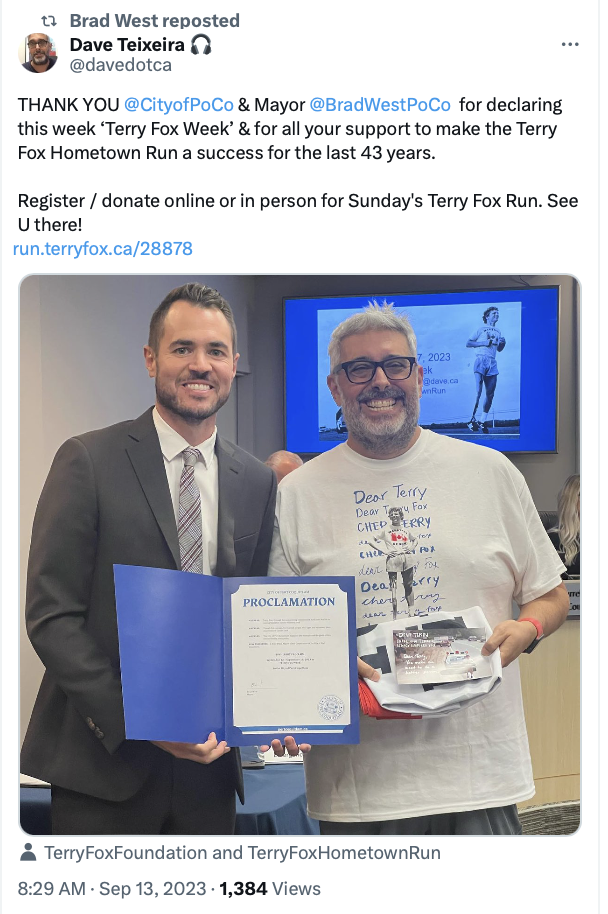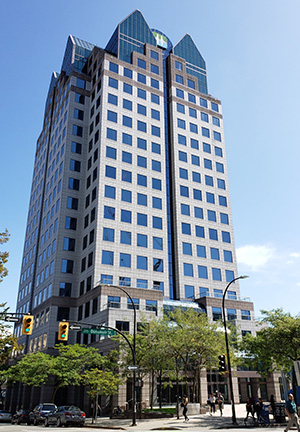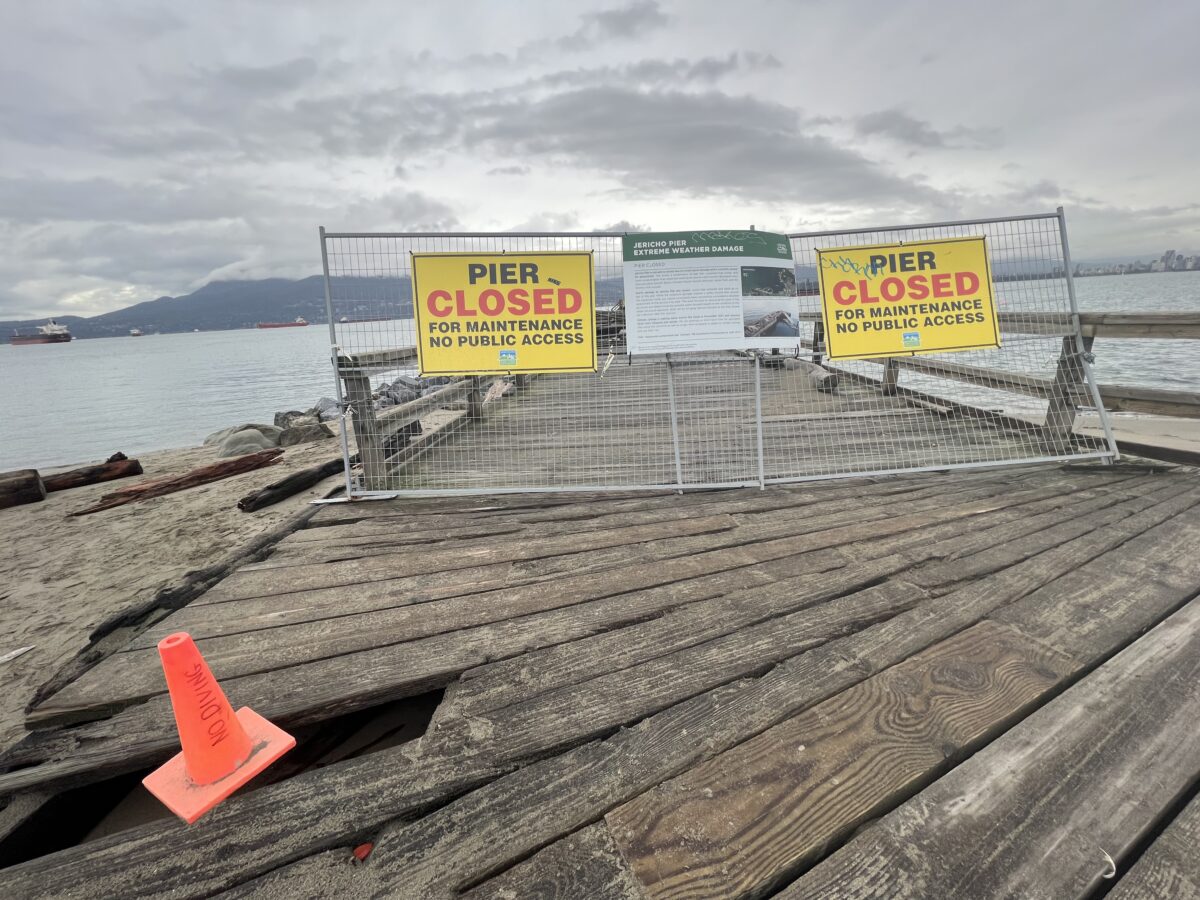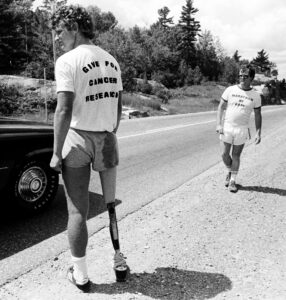Despite the second year back after a pandemic pause, some Terry Fox Runs are virtual on Sunday
Bob Mackin
West Vancouver senior Barb Burton was looking forward to joining the crowd on Centennial Seawalk on Sept. 17 for the annual Terry Fox Run.
It was supposed to be the second year of a return to normal, after the nationwide cancer research fundraiser went virtual in 2020 and 2021 due to the pandemic.
But Burton was surprised to learn that there will not be an in-person walk, run or roll between Dundarave and Ambleside this year.

Terry Fox during the Marathon of Hope (Terry Fox Foundation)
“I really admire him and everything that he did,” said Burton, who remembers jogging in the first Terry Fox Run in 1981 in Stanley Park. “It is a great disappointment, because he had such a fine character and he was selfless, not selfish. He only thought of others and not himself.”
West Vancouver is not alone.
North Vancouver, Port Moody, Squamish, Surrey’s Cloverdale and Newton, and UBC Vancouver are also among 18 B.C. locations listed on TerryFox.org as virtual for Sept. 17.
The reason is simple: A shortage of volunteers.
“Volunteers, they are like gold for us,” said Martha McClew, the Terry Fox Foundation’s vice-president of community and school programs. “So it’s hard to come by, people have really busy lives. More and more charities are finding a bit of a volunteer drain.”
McClew encourages runners, walkers and rollers to search online for their municipality. If they do not have a set time and place in their community, then they can choose their own route and still donate in memory of the late Marathon of Hope hero.
By advertising virtual runs, the cancer-fighting charity can still raise money, but it also sends a message to potential volunteers for next year.
“If you can, list those communities, and say that the Terry Fox Foundation would love the run to come back, and we’ll support volunteers in any way,” McClew asked a reporter.
B.C.’s other virtual locations in 2023 are: Abbotsford, Anmore, Central Saanich, Chase, Golden, Kamloops, Maple Ridge/Pitt Meadows, Nelson, Salmo, Trail and Vernon.
In its 43rd year, the Terry Fox Foundation has raised $850 million. McClew said there are about 550 runs registered across the country this year, down from 2019’s 600.
Port Coquitlam is where Fox grew up and its annual “hometown run” is backed by city hall.

Port Coquitlam Mayor Brad West (left) and Hometown Run organizer Dave Teixeira (Twitter)
“I can’t think of anything that brings a community together like a Terry Fox Run,” said Mayor Brad West, who says non-PoCo residents are also welcome.
“In the absence of anything else, yeah, it’s great to do it virtually. But there’s something to be said for doing it as an event with a bunch of other people who are going through the same range of emotions that you are, and that’s how we build community connection,” West said. “That’s how we build the fabric of our society.”
West declared this Terry Fox Week in his city. Registration begins at 8 a.m. on Sept. 17 before the 10 a.m. start for the 2 km, 6 km and 8 km routes.
When online registration opened nationally on April 12, the anniversary of Fox beginning the Marathon of Hope in 1980 in Newfoundland, so did shipping for the “Dear Terry” T-shirts co-designed by Vancouver-born actor Ryan Reynolds. More than $1.7 million worth of the shirts have been sold so far and McClew expects the fundraiser to hit $2 million by year-end.
“That has been a great part of the story,” McClew said. “[Reynolds is] a really lovely gentleman. I’ve never met him, but he seems very kind of fun and low key and I always feel like that’s very representative of who Terry was.”
Burton has one of those shirts and plans to wear it for her Sunday walk in Fox’s memory and hopes to see others of like mind out in the late summer sunshine.
You are guaranteed to see plenty of those shirts in Port Coquitlam and other in-person events around the Lower Mainland, including Ceperley Park in Vancouver’s Stanley Park, Swangard Stadium in Burnaby, Garry Point Park in Steveston, and River Market in New Westminster. Start time is also 10 a.m.
The Terry Fox Foundation’s impact report for 2021-22, the most-recent year available, said 119 community runs and 1,385 school runs in B.C. raised $2.7 million. Only Ontario, which held 224 community runs and 13,877 at schools, raised more money ($11.7 million).
Go to Run.TerryFox.ca to find your nearest in-person or virtual event or to make a donation.
Support theBreaker.news for as low as $2 a month on Patreon. Find out how. Click here.
Bob Mackin West Vancouver senior Barb Burton was


























